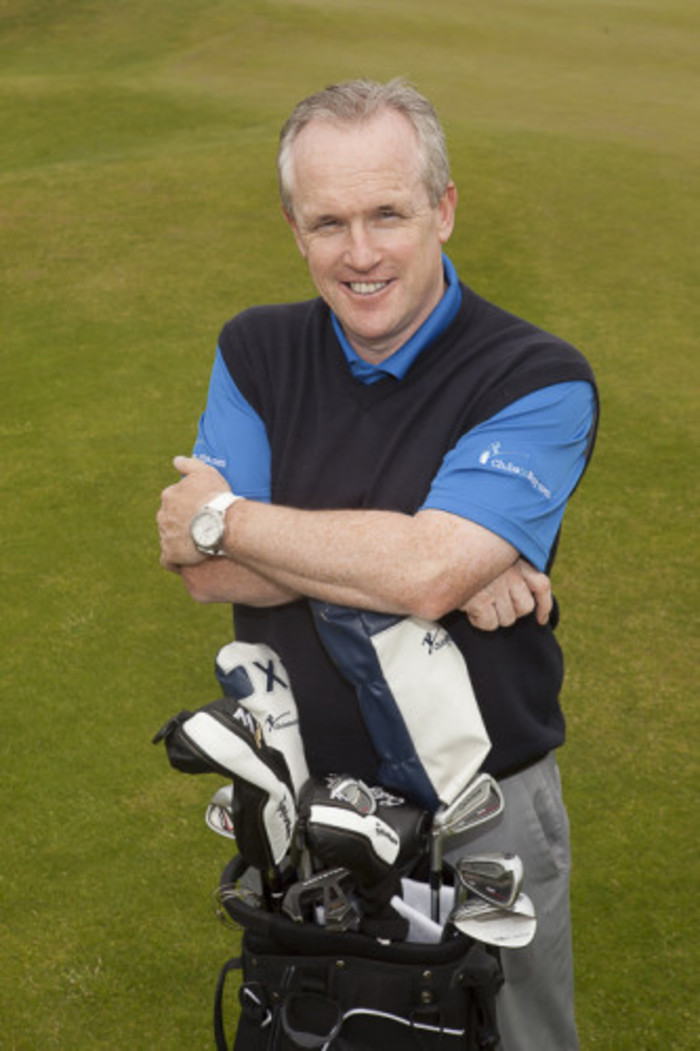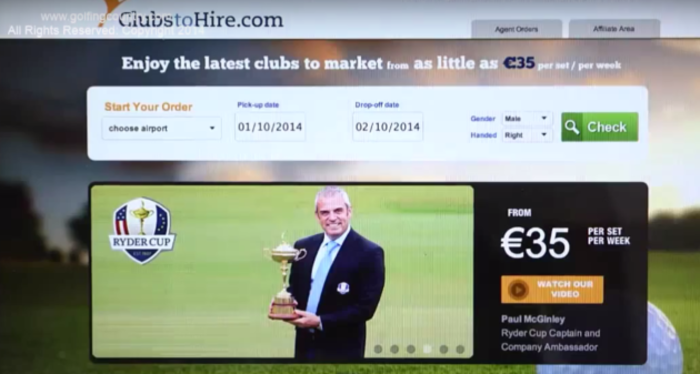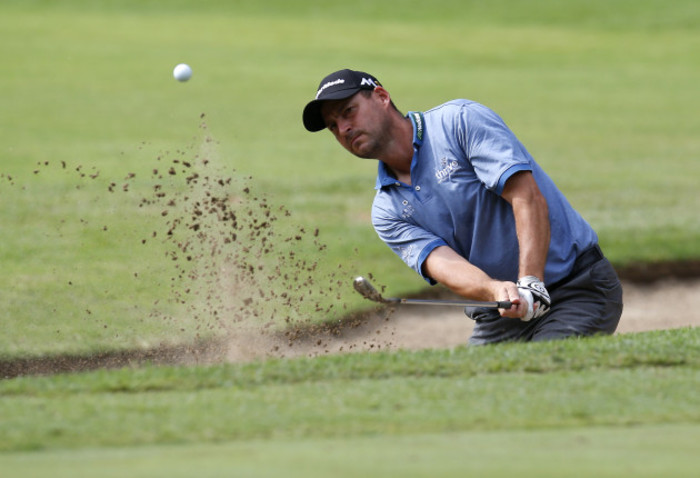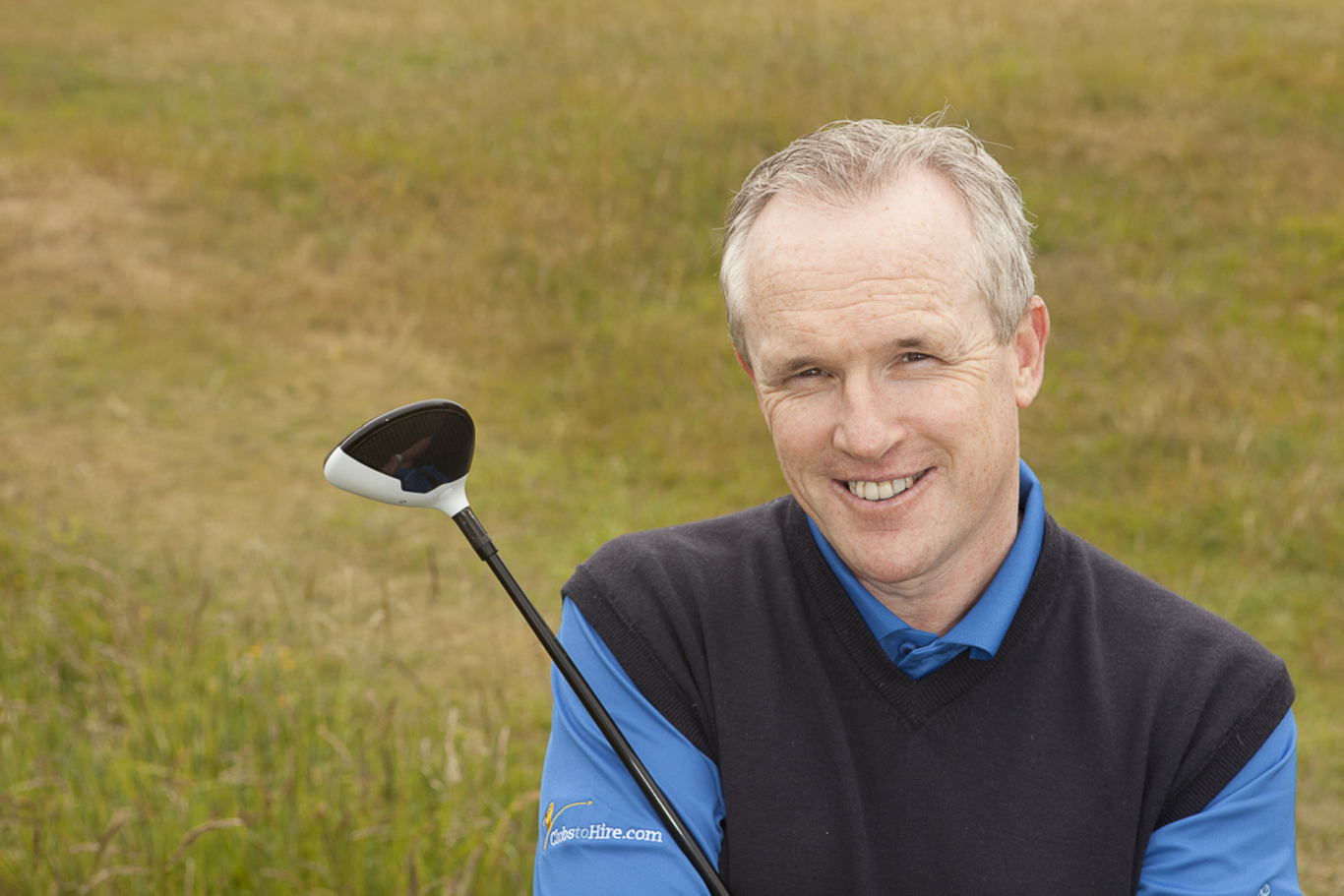'After helping organise the Irish Open, I decided I'd had enough and moved to South Africa'
As part of our How My Business Works series, we profile Dublin golf club rental firm Clubs to Hire.
LIKE MANY INVOLVED in Irish commercial property during the boom, golf was a necessary feature of work for Tony Judge.
Unlike many other high-powered business folk who took up the habit, many of whom were clueless and were more interested in schmoozing clients, Judge actually knew a thing or two about the sport.
The 49-year-old Dubliner, now the CEO of golf club rental firm Clubs to Hire, was the director of golf at the Mount Juliet resort while it was hosting the prestigious Irish Open competition, which drew tens of thousands of people to the Kilkenny property.
He moved to Dublin’s St Margaret’s Golf & Country Club in 1998, where he was general manager for three years before taking a completely different direction and serving as the CEO of a software company in South Africa called Esoft.
“I know absolutely nothing about IT, but I was asked if I would be interested in the move,” he tells Fora. “I was in my early 30s and I decided that I’d had enough of running resorts.
“Seeing the Irish Open and how it grew … it was great to bring in a major event like that (but) you were never going to get bigger than that.”
Judge and his wife, along with their newborn child, Hannah, uprooted themselves to the other side of the world. The Dubliner spent the next few years “tidying up the company” before moving back to Ireland in 2003 as his mother was unwell.
Like many Irish people around that time, Judge got involved with property and set up his own company, Merrion Investment Properties. The firm provided information to Irish people who were looking to invest abroad, making sure that they “got the best deal at the best price”.
Property deals
The bulk of the deals were done with a company called Oceanico, a property firm that owned dozens of golf resorts in Portugal, North America and the Azores.
“When the markets crashed, Oceanico got wound down and I had to try and get my clients’ deposits back,” Judge says.
“Oceanico was reputable and I would say that 95% of people got their money back (but) I went into dealing with a lot of legacy stuff for the next two years. It was an unproductive time from my point of view.”
 Tony Judge
Tony Judge
A positive that would emerge from Judge’s flirtation with property was an introduction to one of his clients, Gerard McKernan who, like him, had a keen interest in golf.
One night the pair were chatting and decided that there was a gap in the market for a company that allowed people to rent golf clubs while abroad, as airlines were charging hefty fees to carry the equipment on planes.
“We both, Gerry predominantly, invested money into the business,” Judge says. “Gerry had his own business at the time and he was very involved in that, so I went off and ran the company in the early days.”
Clubs to Hire opened its first golf club rental outlet at Faro airport in Portugal in 2010. At the time, it could cost as much as €80 for a golf enthusiast to bring their clubs on a European return flight, so the company aimed to undercut this price.
It costs between €35 and €60 to rent clubs for a week from one of the company’s European outlets, depending on the quality of the set. It costs US customers €80 per week.
Expansion
The company buys in “hundreds of sets” of clubs each year, Judge says, before renting them out. Customers book online before collecting from a Clubs to Hire outlet.
When sets are around three years old, the firm looks to sell them on through its own portal, Clubs to Buy.
“By 2012 we had opened up a shop in Malaga airport and after that I was jumping on planes looking to do deals with other airports,” Judge says.
“We were probably adding three or four locations every year for about five years.”
The company was helped in its initial push by its association with one of Ireland’s best-known golfers, Paul McGinley.
McGinley, who studied marketing at Dublin Institute of Technology in the 80s with Judge, became an ambassador for Clubs to Hire and featured in its publicity material.
 Paul McGinley was used to promote the firm
Paul McGinley was used to promote the firm
“It was a natural fit to get Paul to do it. I knew him well and he liked the concept,” Judge says.
“It was very important, people trust you when have a name. Ours was a new concept but when people heard that Paul McGinley was involved, they knew it would be OK. His attachment gave us credibility.”
New ambassador
In 2014, the Sunday Telegraph reported that McGinley had agreed to extend his role as a brand ambassador until 2021 and quoted Judge as saying that the golfer’s profile would help the business grow in new markets.
However, it was subsequently reported that McGinley was no longer involved with the company. Judge does not reveal much about the departure.
“It was a five-year deal and it just finished in 2015, that was the main reason (he left). We agreed to move on.”
The company has since signed a new deal with Englishman David Howell, who was once ranked in the top 10 golfers in the world.
“The UK is a big market for us, and David is well-known and liked in the UK,” Judge says.
 David Howell
David Howell
The company has about 40 staff, five of whom are based in the company’s head office in Dublin. It has about two dozen outlets worldwide, including one in Dublin.
“Our strongholds are Spain and Portugal. People follow the weather and you get an 11-month season in Spain, it’s maybe five or six in Ireland if you’re lucky,” he says.
“We tried Cork and Shannon but it wasn’t worth our while, we didn’t get the demand.”
The company has also struggled to move its model across the Atlantic. It first announced plans to move to the US in 2015, opening four outlets across the country. However, it now only has two, with Judge saying that the company now plans to keep its focus on Europe.
“I don’t think the US market is ready for our concept, or maybe we just didn’t have enough marketing dollars,” Judge says. “We looked at a US (brand ambassador) but we felt that we weren’t getting enough traction to warrant that.
“We have retrenched and are now focused on Europe. The two locations we have in the US are mainly (used by) Europe-based people flying out to the states. They aren’t massive, but people like to know that they can get a high-end service when they are in the US.”
While the company mostly found itself competing with locals renting clubs “out of vans” initially, Judge says that some bigger companies have come into the market over the last few years.
“We compete on price and our people like meeting people,” he says. “We email our customers two to three times a month to let them know what’s going on and we are continually in touch with our base.”
Here and now
Judge says that the firm rented out about 75,000 sets of clubs in 2016, adding that a turnover figure of €3 million is “pretty accurate”.
The company made a small loss of about €90,000 in its 2015 financial year. While Judge says that the company is now profitable, he adds that the company is “continuing to invest any money coming in” on new products, as well as store and website updates.
Clubs to Hire now plans to open a new centre in Faro that will be three times bigger than its existing base. Judge says that this will be the company’s flagship store as he looks to grow the business by “another 50% over the next three to five years”.
“We are just trying to cement our brand and grow organically the way that we have always done,” he says.
Judge emphasises that both he and the company don’t have grand plans for world domination but rather are trying to get on with things and improve steadily.
He sounds genuinely surprised when asked whether he will be sticking with the company in the long-term, saying: “I’m still relatively young so I would like to think that I would be around for another 15, 20 years.
“I’m so focused on the brand that I haven’t given it much thought. I’m very focused on the here and now.”
This article is part of our weekly series examining the nuts and bolts of businesses. If you would like to see your company featured please email news@fora.ie.






